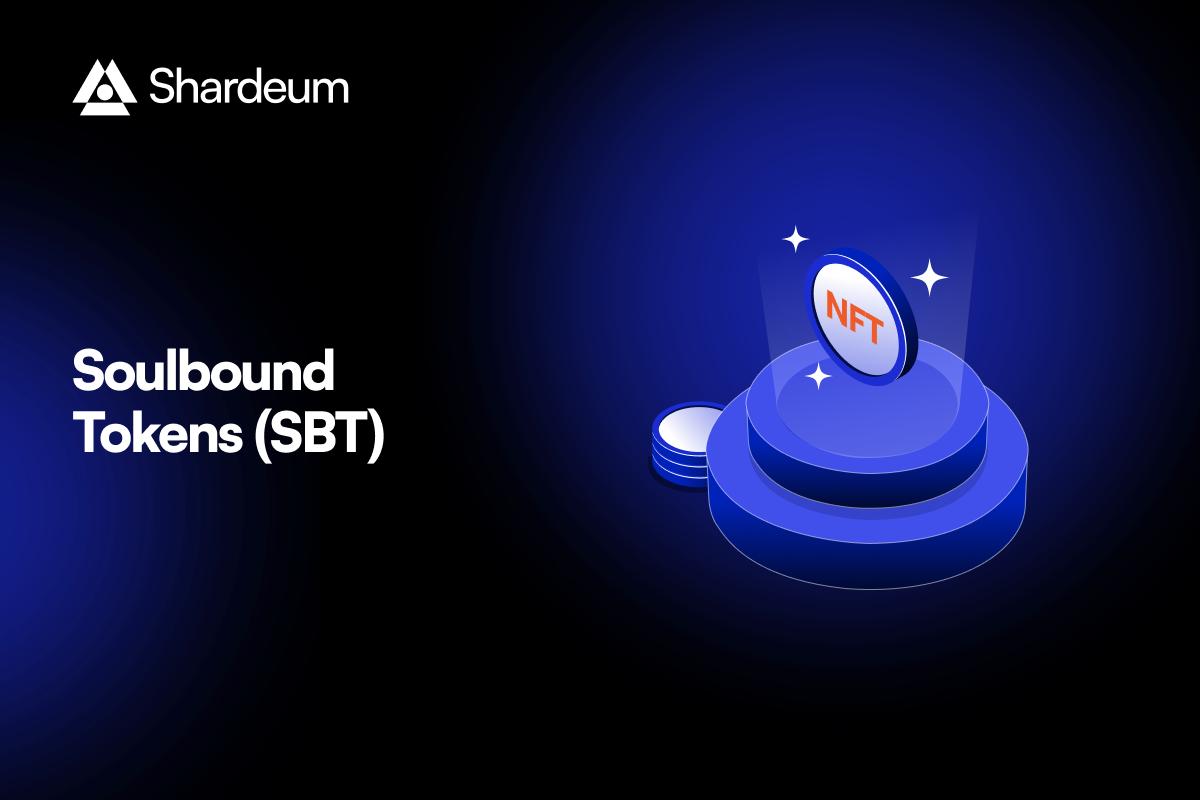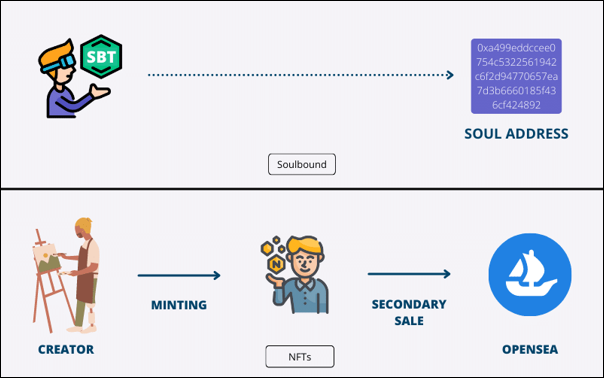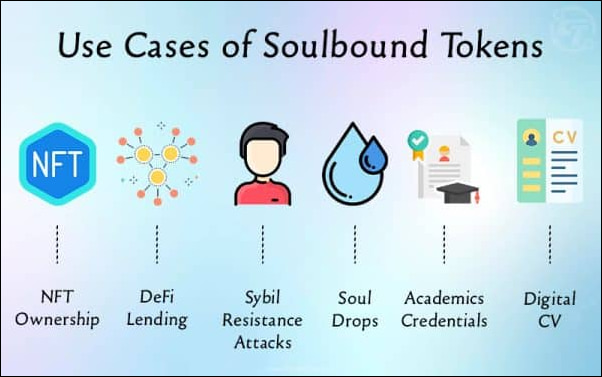
Soulbound Tokens
Soulbound tokens (SBT) are NFTs designed to be permanently linked to a specific user or account, preventing transfer or resale....

Soulbound tokens (SBT) are NFTs designed to be permanently linked to a specific user or account, preventing transfer or resale....
Ethereum’s Co-Founder, Vitalik Buterin, recently proposed a new form of token standards that aims to solve many of the existing shortcomings in Web 3 architecture resulting in increased user adoption/experience. In the 37-page whitepaper, which Vitalik co-authored, he explains how Soulbound Tokens (SBTs) represent Ethereum’s vision for a transparent and sustainable internet.
At the core of SBTs are genuine digital reputation, transparency, and relationship-building ideals. The transferability factor in NFTs and tokens threaten authentic ownership and governance. So, Vitalik’s SBTs seek to create a decentralized society (DeSoc) that promotes human relationships in a native Web 3 way.
So what is the meaning of SBT? Soulbound tokens or SBTs are non-transferable, publicly visible tokens connected to a soul address on blockchain. Although they are non-transferable, they can be revoked by the issuer. A ‘Soul’ is a wallet that houses your SBTs, more like the native wallets for your cryptocurrencies and NFTs.
To further explain an SBT, let’s trace the origin. According to a Vitalik’s blog post, the concept of “Soulbound” originated from a feature of the World of Warcraft game. In the game, formidable items are ‘Soulbound’ that requires completing a difficult task to acquire them. There’s no way around it. The idea is to make the game challenging and fun at the same time.
Imagine a Web 3 native world where participants have Souls (wallets) that stores SBTs equivalent to their educational/professional credentials, memberships, and credible affiliations. A world where Web 3 entities don’t have to depend on centralized institutions in Web 2 to verify the qualifications and identity of an individual. Every event or activity is recorded in their Soul via peer to peer blockchain network.
The non-transferability factor in SBTs is what makes them unique. For instance, the Proof of Attendance model that rewards users with NFTs as proof of participation is prone to hijacking or displacement. An attendee can transfer ownership of their NFTs to another, which defeats the aim of the NFTs. But with SBTs, that’s not the case. Your tokens are yours and can’t be ceded to others.

Now that we know what are Soulbound tokens, let’s see how these SB tokens are meant to work:
The most distinguishing feature of Soulbound tokens would be their non-transferability. In contrast to the more popular token standards in use today, such as the ERC-20 token standard followed by fungible tokens like ETH or the ERC-721 standard followed by NFTs (non-fungible tokens) like Bored Ape Yacht Club, SB tokens are not created to possess a market value, and they, of course, can not be sent across to another wallet.
Put into context in regards to a DeSoc or a decentralized society, Soulbound tokens are issued by as well as kept within- an account called the ‘Souls.’ Therefore, these ‘Souls’ are wallets that hold SB tokens and are used to establish and verify the origin and reputation of something. The Souls can be associated with certain individuals, organizations, or other entities.
The Souls are not necessitated to be in a 1:1 equation with users. This means a person can have more than one Soul within a decentralized society.
The SBTs are, on their own, simply representative and descriptive since their utility and abilities come in part from how these Soulbound tokens held in their respective Souls come together to create communities based on verified affiliations, commitments, and credentials.
As the founders of the Soulbound tokens have explained, the true potential of these SB tokens stretches far and wide. For example, a Soul can issue an SBT with the attestation of other Souls to a new Soul. Thus, Soulbound tokens can work to create digital communities that could serve as a Soul that issues SBTs to the natives of a company.
Similarly, a company can also become a Soul that serves tokens to its stakeholders as a sign of membership. This way, the Soulbound project can aim to fully ensure things like trust, credibility, integrity, and affiliations on web3 networks.
These non-transferable NFTs have the capability to bring the foundation for developing up-and-coming web3 networks that do not have to be wholly dependent on money-centric frameworks. Instead, the Soulbound project can empower web3 networks on the basis of provenance and reputation.

Universities can be a Soul that issues SBTs to students upon graduation. Even a training institute or digital learning platform can be a Soul that gives SBTs upon completion. The best part is that these SBTs can neither be transferred nor sold, which will thereby accurately reflect an individual’s qualifications. By looking at your Soul, Web 3 entities and community can see your educational qualifications and certifications without them having to go through all the bureaucratic process to call your alma mater and confirm them.
Imagine a company is only employing or engaging people who attended a particular event. SBTs will aid the company in choosing only actual attendees. This will also promote active participation and involvement in events that promise SBTs. And mind you, this Proof of Attendance is immutable once the attendance is recorded on the blockchain.
Soulbound Tokens can help NFT creators to build a reputation around their projects and community. They can link SBTs to NFT collections enabling collectors to know which tokens belong to them. It will be a breakthrough for NFT creators because it will help eliminate bad actors from faking and duping the creator’s identity.
SBT implementation will prevent Sybil attacks on DAOs. During a Sybil attack, attackers acquire voting power by paying off the original token holders to approve/reject a proposal. They aim to hack the DAO to suit their selfish needs. With Soulbound tokens, voting rights will remain in the hands of local community members who is vested in DAO’s progress and growth.
Currently, it is difficult to carry out uncollateralized lending in DeFi. Only a few platforms provide this feature under certain conditions. With Soulbound Tokens, here’s how it will work: when you take a loan from crypto lending protocols or exchanges, you’ll be issued an SBT acknowledging the credited loan. And once you repay it, you’ll receive a proof-of-payment SBT cancelling your loan. This will help you when you’re applying for a loan next time as timely repayments demonstrates your credit worthiness.
This may not sound too different from our typical banking experience. But remember with decentralization, a third party will not decide when or how much you are entitled to borrow next time. Instead innovations such as AMM and other automated smart contracts (pre-determined software codes) will enable the lending and borrowing experience with fair rules, additional security and prevention of privacy abuse for money or influence. Further with the concept of low transaction fees in Web 3, SBT loans will naturally come with very low interest rates.
| Advantages of Soulbound Tokens | Disadvantages of Soulbound Tokens |
| SB tokens enable the creation of better, more trustworthy relationships within a decentralized atmosphere. | Soulbound tokens may bring unwanted exposure to sensitive information about the holder. |
| SBTs allow DeFi lending protocols to issue uncollateralized loans, as discussed above. | SBTs are still a very new concept; hence trying them out might turn out to be quite complicated. |
| SB tokens have the potential to improve the voting mechanisms in DAOs (decentralized autonomous organizations) | The mainstream adoption of SBTs could undermine privacy. |
| SBTs can help you employ just the right candidates for a certain job | Holders of a specific type of SBT (perhaps related to a particular political or religious alignment) are potentially at risk of discrimination. |
It’s difficult to predict the exact future of Soulbound Tokens (SBTs) or any other technology, as it will depend on a variety of factors, including how they are adopted and used by individuals and organizations, as well as the evolution of the underlying technology.
However, it is possible that SB tokens could become more widely adopted in the future as people become more familiar with the technology and its potential uses. They have the potential to create new opportunities for creators and collectors, as they allow for the creation and ownership of truly unique, one-of-a-kind assets.
One potential use for SB tokens is in the art world, where they could be used to represent digital artworks that are tied to a specific creator or collector. This would allow for the creation and ownership of truly unique digital artworks, rather than copies that can be endlessly reproduced.
It’s also possible that Soulbound Tokens could be used to represent physical assets, such as real estate or collectibles, and could potentially be used to facilitate the transfer of ownership of these assets in a more secure and efficient manner.
Overall, the future of SB tokens is likely to be influenced by a variety of factors and will depend on how they are adopted and used by individuals and organizations.
One potential risk associated with Soulbound Tokens (SBTs) is that they could be used by bad actors to identify and target specific individuals or groups.
For example, a government or other governing body could use a database of SBTs to deny certain privileges or rights to individuals based on their SBT, such as access to facilities, medical care, travel permits, or voting rights.
There is also the potential for SBTs to be used to facilitate cyber or physical attacks on specific individuals or groups. As a result, it is important that users have the ability to discard or hide their SB tokens if necessary in order to protect themselves from potential harm.
As of August 2022, Soulbound Tokens (SBTs) are still in the conceptual stage and have not yet been implemented in practice. However, it is expected that there will be early use cases for SBTs by the end of 2022.
Binance, a cryptocurrency exchange, recently announced its own version of an SBT called Binance Account Bound (BAB). BAB is a non-transferable, non-monetary token that is designed to be used as a digital verification tool for Binance users who have completed know-your-customer (KYC) procedures.
BAB can also be used for a variety of other purposes, such as airdropping NFTs, preventing bot activity, and facilitating governance voting in decentralized autonomous organizations (DAOs). Third-party protocols will also be able to use BAB tokens for these and other purposes.
The user adoption of Web 3 peaked in 2021, with NFT trending major headlines across media outlets. But there are shortcomings in the current DeFi and NFT ecosystems which are taken advantage by bad actors and high handed people in power. Will the Soulbound token proposition be a game-changer in Web 3 considering the shortcomings it aims to solve? Time will tell. But one thing is certain. The future of Web 3 and crypto looks promising, and I am of the opinion that SBTs are at least a step in the right direction with a conviction to improve the underlying blockchain technology which enables the crypto ecosystem.
The primary downside of crypto wallets is that your money is almost irrecoverable once you lose your private keys and worse, your passphrases’. But this changes with SBTs. If you eventually lose your Soul keyphrases, there’s a system called ‘Community Wallet Recovery’ that will aid you in recovering your Soulbound tokens. Members of your Soul community need to consent for you to recover your keys. It is like a consensus algorithm deployed in a blockchain protocol, in this case, to validate your ownership of the Soul.
It is a possibility that you might be spammed with fake tokens. Whitepaper of SBTs propose to burn such NFTs without any gas fees incurred.
E. Glen Weyl, one of the co-authors of the original Soulbound Token (SBT) whitepaper, originally predicted that SBTs could become available by the end of 2022. However, a number of nascent projects using the technology have already emerged. These early uses of SB tokens are likely to be the first steps towards the development of a more widespread and comprehensive SBT ecosystem.
Components of Blockchain Technology | What is a Flash Loan Attack | Popular Metaverse Platforms | What is a Blockchain Platform | NFT Risks and Challenges | What is a Cross-Chain Bridge | What is a Mainnet | Types of Sharded Blockchain | List of Wrapped Tokens | Quantum Computers and Cryptography | Crypto Faucet Apps | Cryptocurrency Business Model | Hard Fork vs Soft Fork | What is Crypto Lending | What is Proof of Stake in Sharding | Decentralized vs Centralized Crypto | Zcash Mining | What is Layer 1 Blockchain | TVL Blockchain | How Lisk Works
Disclaimers : This blog was originally published by the author on his Substack. Opinions expressed in this publication are those of the author(s). They do not necessarily purport to reflect the opinions or views of Shardeum Foundation.
About the Author : Aaron Barboza is a full time crypto community manager who is also involved in various marketing & comms outreach. You can follow him on Twitter